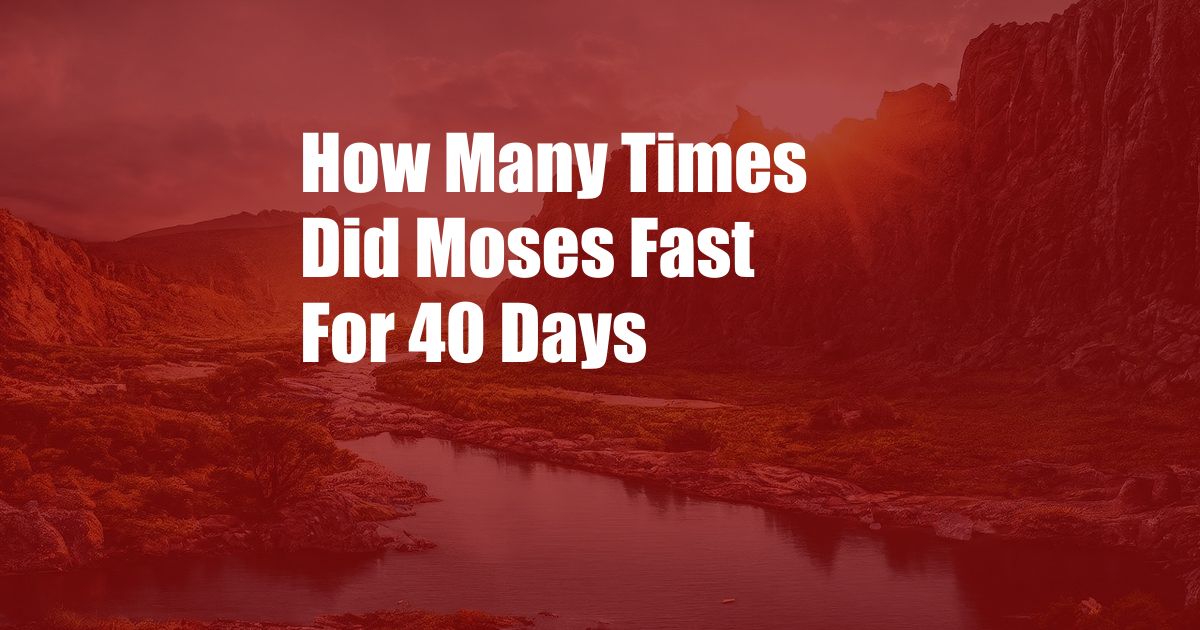
How Many Times Did Moses Fast for 40 Days?
In the Old Testament of the Bible, Moses is an iconic figure who played a pivotal role in the liberation of his people from slavery in Egypt and the establishment of the Ten Commandments, the foundational principles of Jewish law. His life and teachings have left an enduring legacy on religious and cultural traditions. One notable aspect of Moses’s life is the repeated mention of his fasting for 40 days and 40 nights.
The narrative of Moses’s fasting appears in several passages in the Book of Exodus, notably in chapters 24, 32, and 34. In each instance, the context and purpose of his fasting vary. However, the duration of 40 days and nights remains constant, making it a significant element in understanding Moses’s spiritual journey and relationship with God.
The Significance of 40 Days
The number 40 holds profound significance in biblical numerology. Throughout the Bible, it often represents a period of testing, purification, transformation, or divine favor. The Israelites’ 40 years of wandering in the wilderness before entering the Promised Land is one notable example. In the case of Moses, his 40-day fasts appear to serve similar purposes.
Moses’ First 40-Day Fast (Exodus 24)
The first recorded instance of Moses fasting for 40 days occurs during his ascent of Mount Sinai to receive the Ten Commandments. During this time, Moses neither eats nor drinks, exhibiting his complete devotion and receptiveness to God’s word. This fast symbolizes his purification and readiness to receive the divine law that would shape his people’s lives.
Moses’ Second 40-Day Fast (Exodus 32)
The second 40-day fast occurs after the Israelites fashion a golden calf as an idol. Dismayed and angered by their disobedience, Moses intercedes on their behalf, seeking God’s forgiveness. During this fast, Moses does not eat or drink, demonstrating his sorrow for his people’s transgression and his desire to restore their relationship with God.
Moses’ Third 40-Day Fast (Exodus 34)
The final recorded instance of Moses fasting for 40 days takes place after the Israelites sin again. Moses returns to Mount Sinai to receive new tablets of the Ten Commandments. During this fast, he expresses his love for God and his people. This fast signifies his renewed commitment and the importance of faithfulness to the divine covenant.
The Importance of Fasting in Moses’ Life
Moses’s 40-day fasts serve as powerful reminders of the significance of fasting as a spiritual practice. Fasting can be a means of self-denial and sacrifice, setting aside the physical needs of the body to focus on the spiritual. It can also be a way of seeking divine favor, purification, and cleansing. In Moses’s case, his fasts played a crucial role in his relationship with God. They allowed him to draw closer to God, receive divine guidance, and intercede on behalf of his people.
Expert Advice on Fasting
Fasting can be a transformative experience, but it is important to approach it wisely. Here’s some expert advice for those considering fasting:
- Consult with a healthcare professional before fasting to ensure it is safe for your individual needs.
- Start gradually by fasting for shorter periods and gradually increase the duration as tolerated.
- Hydrate adequately during fasting periods by drinking plenty of fluids, such as water or herbal teas.
- Listen to your body and break the fast if you experience any discomfort or adverse effects.
- Use fasting as a means of spiritual growth and renewal, rather than a quick fix for weight loss or other physical benefits.
FAQ on Moses’ Fasting
- Q: Why did Moses fast for 40 days?
A: Moses fasted for 40 days to purify himself, receive divine guidance, and intercede on behalf of his people.
- Q: How many times did Moses fast for 40 days?
A: Moses fasted for 40 days on three separate occasions: after ascending Mount Sinai to receive the Ten Commandments, after the Israelites sinned by worshiping the golden calf, and after their further rebellion.
- Q: What is the spiritual significance of fasting?
A: Fasting can be a means of self-denial, purification, seeking divine favor, and experiencing spiritual growth.
Conclusion
Moses’s 40-day fasts are powerful reminders of the importance of fasting as a spiritual practice. They demonstrate his unwavering devotion to God and his readiness to endure hardship for the sake of his people. Whether you are a student of religious history or a seeker of spiritual growth, Moses’s example can inspire you to explore the transformative power of fasting.
Are you interested in learning more about Moses’s fasts or other aspects of his life and teachings? Share your questions and insights in the comments section below.